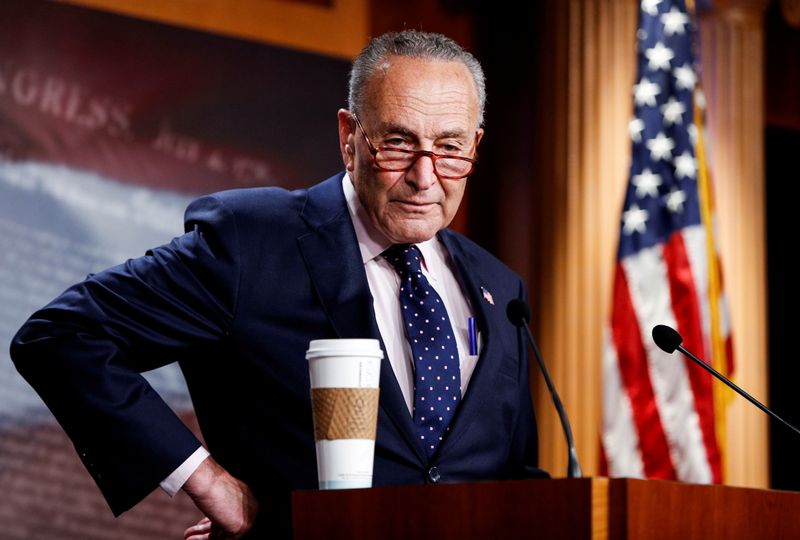By Timothy Gardner
WASHINGTON (Reuters) - Senate Majority Leader Chuck Schumer said on Wednesday that the United States would be on track to meet its climate goals in the next decade, with measures introduced in two infrastructure bills along with efforts by states and the federal government.
President Joe Biden in April hiked the U.S. target for slashing economy-wide greenhouse gas emissions to 50%-52% from 2005 levels by 2030.
Schumer said in a letter to fellow lawmakers that climate measures in the $1 trillion bipartisan infrastructure bill and a $3.5 trillion bill https://www.reuters.com/world/us/after-setback-us-house-democrats-near-deal-biden-agenda-2021-08-24 will achieve emissions reductions of about 45% by 2030. Actions being planned by the Biden administration and states including New York, California and Hawaii would help hit the 50% target, he added.
"The bottom line is this: we have very little time to prevent the most horrendous outcomes for our children and grandchildren," Schumer said in the letter. "But if we act
now and act boldly, we can mitigate the worst effects of climate change and own the 21st century clean energy economy."
Two measures in particular in the bills, he said, would help put the United States on the path to dramatically slash emissions: the Clean Electricity Payment Program (CEPP) and the Senate Finance Committee’s tax package on clean energy and vehicles.
Both measures are in the wider bill that Democrats in the Senate hope to pass over the next few months using a process called budget reconciliation https://www.reuters.com/world/us/us-senates-reconciliation-process-its-not-way-it-sounds-2021-06-16, which bypasses the chamber's usual rules requiring 60 votes to pass most legislation.
The CEPP is a system of payments and penalties that aims to push utilities to increase power generation from clean energy sources including wind, solar and nuclear power. Many lawmakers and the White House had originally favored a Clean Electricity Standard, which is similar but includes mandates.
The tax package would extend tax breaks for clean energy and clean transportation fuels. It could also abolish tax breaks for oil, gas and coal production - which would be a tough sell for Democrats from states dependent on fossil fuel revenue.

As Congress debates the climate measures, wildfires have been tearing through Western states https://www.reuters.com/world/us/smoke-us-west-wildfires-leaves-easterners-gasping-2021-07-20 while floods killed at least 18 people in Tennessee https://www.reuters.com/world/us/us-president-biden-approves-federal-aid-tennessee-after-flooding-2021-08-24 - examples of extreme weather impact that will become more frequent and severe with climate change.
Schumer also said he looked forward to seeing other ideas from lawmakers for cutting emissions.